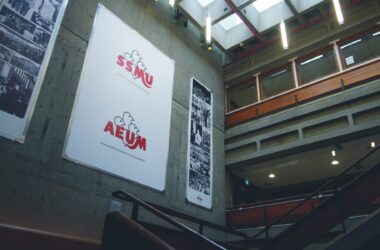 Sophie Silkes
Sophie SilkesOn January 31, over 180 students, faculty, and community members attended a talk on local food system politics, delivered by Jon Steinman, broadcaster and host of the Nelson-based, internationally broadcast radio show “Deconstructing Dinner.”
Oliver de Volpi, McGill’s executive chef, introduced Steinman and provided the crowd with mostly locally grown snacks sourced from the Macdonald Campus Farm.
Steinman, a Nelson, B.C., resident and avid proponent of the local-food movement, spent the first half of his talk emphasizing the risks inherent in supporting industrialized, large-scale agriculture.
“We have very little choice but to invest in the industrial food system,” he said. “Is this investment secure? When we deconstruct it, the short answer is ‘No.'”
Steinman highlighted the six “food security concerns” which he argued should be at the forefront of our consumer awareness. He emphasized his third point, “corporate concentration,” as the most critical for our understanding. Steinman cited Cargill—which, according to their website, is an “international producer and marketer of food, agricultural, financial, and industrial products and services”—as an example of how monopolized and vertically integrated contemporary food systems have become.
Cargill controls 40 per cent of slaughter capacity and 17 per cent of all grain in Canada, and also holds large stakes in the canola oil, corn, sugar, ginger ale, and ice cream markets. Cargill is also one of Canada’s largest producers of plant fertilizer, natural gas, salt, and corn plastics.
Steinman built off the example of Cargill to issue his plea for awareness of the possible perils of submitting to large-scale food systems and a call for widespread, holistic interaction between the consumers and their food.
According to Steinman, the fatal flaw of food production today amounts to the fact that “there’s a lot of money in the food system. It’s just not ending up in the pockets of the farmers.”
After spending half of his talk discussing the current way in which consumers are inadvertently perpetuating the poor conditions of mass food production, Steinman described viable alternatives to supporting industrialized agriculture.
“We live in a food system today that is quite a monoculture,” he said, urging listeners to cultivate external food systems through community shared agricultures and community cooperatives.
“We’re talking about trying to shift from one [food system] that is deeply rooted to one that is outside of the box,” he said.
The event, co-sponsored by McGill Food and Dining Services and the McGill Office of Sustainability also functioned as an official and public introduction to MFDS’s new sustainability strategy.
“The talk was a wonderful forum for people from UQAM, UdeM and Concordia, as well as for outside groups—Ailments d’Ici, the Montreal Permaculture Guild—who were at the talk as well,” said Sarah Archibald, a U2 student and a coordinator for the Food Systems Project.
For the third portion of the gathering, audience members heard from Jonathan Glencross, the U3 architect behind the $2.4 million endowed Sustainability Projects Fund and one of the founders of the McGill Food Systems project, Laura Rhodes, the McGill’s Food Systems administrator, and Lilith Wyatt, the Sustainability Projects coordinator.
Rhodes unveiled MFDS’s strategic action plan towards sustainable food purchasing.
“How can a commitment to sustainable food systems at McGill create and support a culture of sustainability at the university?” Rhodes asked the crowd.
Rhodes presented a cohesive business model that involves applied student research in the creation of long lasting partnerships with local farms and suppliers who would supply dining locations on campus while keeping the McGill community informed about the sustainability of its own food systems.
“If the end result is a system that students and professors are excited to study, staff and administrators are enthusiastic to run, and all campus members are proud to eat from, then we have succeeded in creating a culture of sustainability at McGill,” Glencross said.







